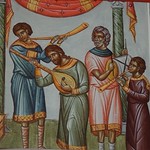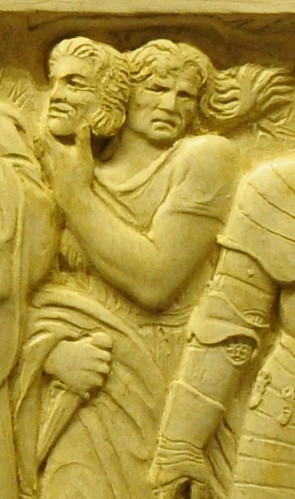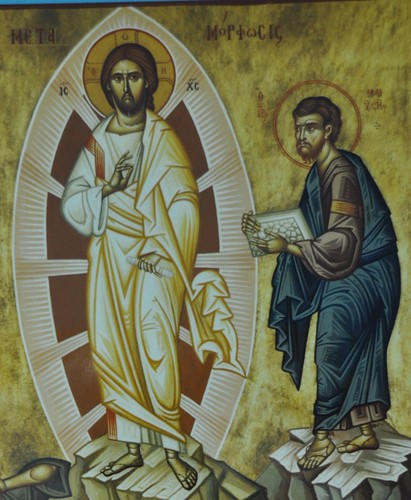 This is the 2nd blog in this series which began with “What Does It Mean to be Human?” In this series I am looking at the recent book by evolutionary biologist Edward O. Wilson, The Social Conquest of Earth. Wilson presents in well written manner a storyline with plot of how the anthropological and evolutionary evidence can be read to give us an idea of how possibly humanity emerged on earth. Wilson dismisses religious interpretation of human being, which will be part of what I react to in this blog series. Wilson offers his materialistic answer to the question, “What does it mean to be human?”:
This is the 2nd blog in this series which began with “What Does It Mean to be Human?” In this series I am looking at the recent book by evolutionary biologist Edward O. Wilson, The Social Conquest of Earth. Wilson presents in well written manner a storyline with plot of how the anthropological and evolutionary evidence can be read to give us an idea of how possibly humanity emerged on earth. Wilson dismisses religious interpretation of human being, which will be part of what I react to in this blog series. Wilson offers his materialistic answer to the question, “What does it mean to be human?”:
“The biological human mind is our province. With all its quirks, irrationality, and risky productions, and all its conflict and inefficiency, the biological mind is the essence and the very meaning of the human.” (Kindle Loc. 1706-8)
 The “biological mind” is the interesting phrase. As an atheist committed to materialism, there can be no mind beyond the biological, and yet the exact relationship of mind to brain is not perfectly clear. Wilson will be in the camp of those who dismiss free will and for whom consciousness presents a particular challenge because there can for him be nothing that is not biologically based. We will come back to these issues in a future blog, for now we will continue to look at what Wilson sees as unique to the human species:
The “biological mind” is the interesting phrase. As an atheist committed to materialism, there can be no mind beyond the biological, and yet the exact relationship of mind to brain is not perfectly clear. Wilson will be in the camp of those who dismiss free will and for whom consciousness presents a particular challenge because there can for him be nothing that is not biologically based. We will come back to these issues in a future blog, for now we will continue to look at what Wilson sees as unique to the human species:
 “Besides the bulging forehead, oversize brain, and long, tapering fingers, our species bears other striking biological features of the kind biological taxonomists call ‘diagnostic.’ This means that in combination, some of our traits are unique among all animals:
“Besides the bulging forehead, oversize brain, and long, tapering fingers, our species bears other striking biological features of the kind biological taxonomists call ‘diagnostic.’ This means that in combination, some of our traits are unique among all animals:
• A productive language based on infinite permutations of arbitrarily invented words and symbols.
 • Music, comprising a wide array of sounds, also in infinite permutations and played in individually chosen mood-creating patterns; but, most definitively, with a beat.
• Music, comprising a wide array of sounds, also in infinite permutations and played in individually chosen mood-creating patterns; but, most definitively, with a beat.
• Prolonged childhood, allowing extended learning periods under the guidance of adults.
• Anatomical concealment of female genitalia and the abandonment of advertisement of ovulation, both combined with continuous sexual activity. The latter promotes female-male bonding and biparental care, which are needed through the long period of helplessness in early childhood.
 • Uniquely fast and substantial growth in the brain size during early development, increasing 3.3 times from birth to maturity.
• Uniquely fast and substantial growth in the brain size during early development, increasing 3.3 times from birth to maturity.
• Relatively slender body form, small teeth, and weakened jaw muscles, indicative of an omnivorous diet.
• A digestive system specialized to eat foods that have been tenderized by cooking.” (Kindle Loc. 1404-21)
 It is interesting that some of the very things Wilson sees as unique to humanity would also be noted by Theists who accept the claim of Genesis 1 that we humans are created in the image and likeness of God. And it was vigorously discussed throughout Christian history what exactly about us is in God’s image? Many Church Fathers agreed that it is not a physical trait and they like Wilson looked to such things as language, symbolic and abstract thinking, creativity – using things which exist in nature to further create such things as art and music AND inventing and manufacturing things which don’t exist in nature for art and science, modesty and virtue, controlling sexual activity and the formation of moral thinking, creativeness in using foods even in symb0lic and sacramental ways.
It is interesting that some of the very things Wilson sees as unique to humanity would also be noted by Theists who accept the claim of Genesis 1 that we humans are created in the image and likeness of God. And it was vigorously discussed throughout Christian history what exactly about us is in God’s image? Many Church Fathers agreed that it is not a physical trait and they like Wilson looked to such things as language, symbolic and abstract thinking, creativity – using things which exist in nature to further create such things as art and music AND inventing and manufacturing things which don’t exist in nature for art and science, modesty and virtue, controlling sexual activity and the formation of moral thinking, creativeness in using foods even in symb0lic and sacramental ways.

Though some evolutionary biologists downplay the difference between human intelligence and that of other species, many admit that human intelligence is so different from the intelligence of any other species that evolution cannot really account for this difference.
 “Michael Tomasello and his co-workers in biological anthropology, developed during the past three decades. These researchers point out that the primary and crucial difference between human cognition and that of other animal species, including our closest genetic relatives, the chimpanzees, is the ability to collaborate for the purpose of achieving shared goals and intentions. The human specialty is intentionality, fashioned from an extremely large working memory. We have become the experts at mind reading, and the world champions at inventing culture. We not only interact intensely with one another, as do other animals with advanced social organizations, but to a unique degree we have added the urge to collaborate.” (Kindle Loc. 3621-27)
“Michael Tomasello and his co-workers in biological anthropology, developed during the past three decades. These researchers point out that the primary and crucial difference between human cognition and that of other animal species, including our closest genetic relatives, the chimpanzees, is the ability to collaborate for the purpose of achieving shared goals and intentions. The human specialty is intentionality, fashioned from an extremely large working memory. We have become the experts at mind reading, and the world champions at inventing culture. We not only interact intensely with one another, as do other animals with advanced social organizations, but to a unique degree we have added the urge to collaborate.” (Kindle Loc. 3621-27)
Memory and culture and intentional collaboration would also be noted by theologians as ways in which humans are different from all the rest of creation.
 “The creative arts became possible as an evolutionary advance when humans developed the capacity for abstract thought. The human mind could then form a template of a shape, or a kind of object, or an action, and pass a concrete representation of the conception to another mind. Thus was first born true, productive language, constructed from arbitrary words and symbols.” (Kindle Loc. 4486-88)
“The creative arts became possible as an evolutionary advance when humans developed the capacity for abstract thought. The human mind could then form a template of a shape, or a kind of object, or an action, and pass a concrete representation of the conception to another mind. Thus was first born true, productive language, constructed from arbitrary words and symbols.” (Kindle Loc. 4486-88)
What was also born along with “true, productivity language” is the notion of truth. There is no such thing as truth or fact or science without the conscious observer. This is a new truth that has been revealed through quantum physics. There is no truth without a conscious observer. We humans in fact exist to discover truth. We have a purpose in nature and Wilson though he doesn’t seem to recognize it, uses the gift of conscious observation to seek out truth. Truth doesn’t just come to him, he has to consciously choose to seek it, to uncover it hidden in the natural world. Evolution has in fact brought into existence the very beings needed to consciously observe the universe.
 For theists at least, that humanity has a purpose comes as no surprise. That evolutionary biologists don’t recognize conscious observation as a product of the evolutionary process speaks more about their ideological commitment to determinism then it does of their commitment to revealing truth.
For theists at least, that humanity has a purpose comes as no surprise. That evolutionary biologists don’t recognize conscious observation as a product of the evolutionary process speaks more about their ideological commitment to determinism then it does of their commitment to revealing truth.
Before getting to issues which atheists and theists disagree on, the next blog will take a very quick tour through 120 million years of history that were the needed prerequisite to our current situation on planet earth.
Next: A Very Quick Tour of Evolutionary History


















 “Besides the bulging forehead, oversize brain, and long, tapering fingers, our species bears other striking biological features of the kind biological taxonomists call ‘diagnostic.’ This means that in combination, some of our traits are unique among all animals:
“Besides the bulging forehead, oversize brain, and long, tapering fingers, our species bears other striking biological features of the kind biological taxonomists call ‘diagnostic.’ This means that in combination, some of our traits are unique among all animals:  • Music, comprising a wide array of sounds, also in infinite permutations and played in individually chosen mood-creating patterns; but, most definitively, with a beat.
• Music, comprising a wide array of sounds, also in infinite permutations and played in individually chosen mood-creating patterns; but, most definitively, with a beat.  • Uniquely fast and substantial growth in the brain size during early development, increasing 3.3 times from birth to maturity.
• Uniquely fast and substantial growth in the brain size during early development, increasing 3.3 times from birth to maturity.  It is interesting that some of the very things Wilson sees as unique to humanity would also be noted by Theists who accept the claim of Genesis 1 that we humans are created in the image and likeness of God. And it was vigorously discussed throughout Christian history what exactly about us is in God’s image? Many Church Fathers agreed that it is not a physical trait and they like Wilson looked to such things as language, symbolic and abstract thinking, creativity – using things which exist in nature to further create such things as art and music AND inventing and manufacturing things which don’t exist in nature for art and science, modesty and virtue, controlling sexual activity and the formation of moral thinking, creativeness in using foods even in symb0lic and sacramental ways.
It is interesting that some of the very things Wilson sees as unique to humanity would also be noted by Theists who accept the claim of Genesis 1 that we humans are created in the image and likeness of God. And it was vigorously discussed throughout Christian history what exactly about us is in God’s image? Many Church Fathers agreed that it is not a physical trait and they like Wilson looked to such things as language, symbolic and abstract thinking, creativity – using things which exist in nature to further create such things as art and music AND inventing and manufacturing things which don’t exist in nature for art and science, modesty and virtue, controlling sexual activity and the formation of moral thinking, creativeness in using foods even in symb0lic and sacramental ways.
 “Michael Tomasello and his co-workers in biological anthropology, developed during the past three decades. These researchers point out that the primary and crucial difference between human cognition and that of other animal species, including our closest genetic relatives, the chimpanzees, is the ability to collaborate for the purpose of achieving shared goals and intentions. The human specialty is intentionality, fashioned from an extremely large working memory. We have become the experts at mind reading, and the world champions at inventing culture. We not only interact intensely with one another, as do other animals with advanced social organizations, but to a unique degree we have added the urge to collaborate.” (Kindle Loc. 3621-27)
“Michael Tomasello and his co-workers in biological anthropology, developed during the past three decades. These researchers point out that the primary and crucial difference between human cognition and that of other animal species, including our closest genetic relatives, the chimpanzees, is the ability to collaborate for the purpose of achieving shared goals and intentions. The human specialty is intentionality, fashioned from an extremely large working memory. We have become the experts at mind reading, and the world champions at inventing culture. We not only interact intensely with one another, as do other animals with advanced social organizations, but to a unique degree we have added the urge to collaborate.” (Kindle Loc. 3621-27) “The creative arts became possible as an evolutionary advance when humans developed the capacity for abstract thought. The human mind could then form a template of a shape, or a kind of object, or an action, and pass a concrete representation of the conception to another mind. Thus was first born true, productive language, constructed from arbitrary words and symbols.” (Kindle Loc. 4486-88)
“The creative arts became possible as an evolutionary advance when humans developed the capacity for abstract thought. The human mind could then form a template of a shape, or a kind of object, or an action, and pass a concrete representation of the conception to another mind. Thus was first born true, productive language, constructed from arbitrary words and symbols.” (Kindle Loc. 4486-88) For theists at least, that humanity has a purpose comes as no surprise. That evolutionary biologists don’t recognize conscious observation as a product of the evolutionary process speaks more about their ideological commitment to determinism then it does of their commitment to revealing truth.
For theists at least, that humanity has a purpose comes as no surprise. That evolutionary biologists don’t recognize conscious observation as a product of the evolutionary process speaks more about their ideological commitment to determinism then it does of their commitment to revealing truth.
 “Let not your hearts be troubled; believe in God, believe also in me. In my Father’s house are many rooms; if it were not so, would I have told you that I
“Let not your hearts be troubled; believe in God, believe also in me. In my Father’s house are many rooms; if it were not so, would I have told you that I 
 For example, physicists puzzle over why gravity is such a feeble force. As noted in the July 2012 issue of
For example, physicists puzzle over why gravity is such a feeble force. As noted in the July 2012 issue of 

 Some of what the new scientific discoveries are showing is that there is built in the physics of the universe some indeterminacy or uncertainty. There actually are things we cannot know – not because we lack the instruments but because of the very way things are.
Some of what the new scientific discoveries are showing is that there is built in the physics of the universe some indeterminacy or uncertainty. There actually are things we cannot know – not because we lack the instruments but because of the very way things are.
 For believers all of this means that we do not have to choose between science and religion, or between faith and reason. For what may be emerging is that science is recognizing that mystery is part of the universe, and that there may be more to the universe than we can measure or observe or test in experimentation.
For believers all of this means that we do not have to choose between science and religion, or between faith and reason. For what may be emerging is that science is recognizing that mystery is part of the universe, and that there may be more to the universe than we can measure or observe or test in experimentation.
 So the poor voters are left with coming up with their own remedies to protect themselves from cynicism when politicians speak especially during campaigns. Ohio, my home state, was currently bombarded by campaign ads for the Republican candidates in the recent primary. Apparently though complete disclosure about how much is spent on campaign ads does not have to be disclosed. So it is estimated that Mitt Romney alone spent $12 million on campaign ads in Ohio. Radio stations found this to be a very enriching time. Freedom of speech is profitable for some. I’m proud to note that I never heard even one of these ads – I don’t normally attune to commercial radio or television so I was spared this invasive, toxic species of advertising. My attitude toward campaign advertising is the same as certain candidates toward OPEC countries: let them drown in their oil. I also have the same expectation regarding the actual effect of my boycotting commercial radio will have on campaign spending as the the notion that America can produce enough oil to cut off our dependency on foreign oil: virtually none. Americans as insatiable consumers are as addicted to foreign oil as they are to negative campaign ads. No president is going to be able to cause such a production in US oil as to eliminate the need for foreign oil. Promising some low dollar-per-gallon gasoline price tag is a guarantee no president has the power to fulfill, especially not one who believes in a free market. But I digress.
So the poor voters are left with coming up with their own remedies to protect themselves from cynicism when politicians speak especially during campaigns. Ohio, my home state, was currently bombarded by campaign ads for the Republican candidates in the recent primary. Apparently though complete disclosure about how much is spent on campaign ads does not have to be disclosed. So it is estimated that Mitt Romney alone spent $12 million on campaign ads in Ohio. Radio stations found this to be a very enriching time. Freedom of speech is profitable for some. I’m proud to note that I never heard even one of these ads – I don’t normally attune to commercial radio or television so I was spared this invasive, toxic species of advertising. My attitude toward campaign advertising is the same as certain candidates toward OPEC countries: let them drown in their oil. I also have the same expectation regarding the actual effect of my boycotting commercial radio will have on campaign spending as the the notion that America can produce enough oil to cut off our dependency on foreign oil: virtually none. Americans as insatiable consumers are as addicted to foreign oil as they are to negative campaign ads. No president is going to be able to cause such a production in US oil as to eliminate the need for foreign oil. Promising some low dollar-per-gallon gasoline price tag is a guarantee no president has the power to fulfill, especially not one who believes in a free market. But I digress. What I really wanted to mention is a most fascinating piece I heard on National Public Radio. The piece by Travis Larchuk is called
What I really wanted to mention is a most fascinating piece I heard on National Public Radio. The piece by Travis Larchuk is called